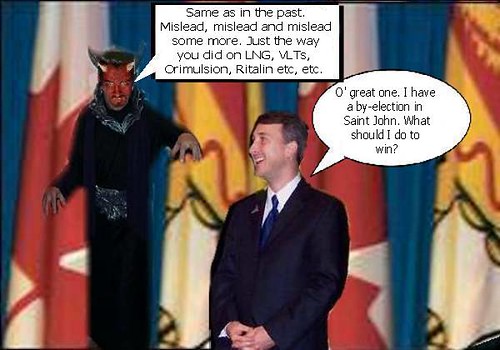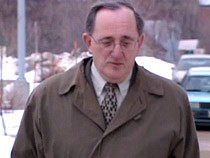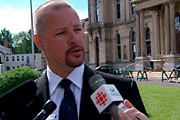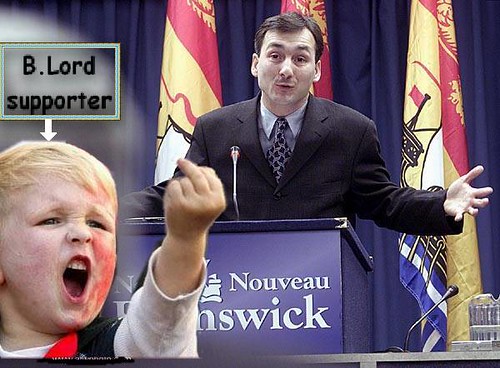

ADHD: are drugs the answer?
Written by Kieren McCarthy
Child prescriptions for the behavioural drug Ritalin rocketed again in the UK last year. But is this down to wider treatment of attention disorders, or a more disturbing trend of keeping kids under control with psychoactive drugs?
Impulsiveness, restlessness and hyperactivity, as well as inattentiveness are symptoms of ADHD and often prevent children from learning and socialising well.
Figures from the Department of Health show that in 2002, approximately 208,000 prescriptions were issued for the drug Ritalin – an amphetamine given in tablet form – in order to tackle attention deficit hyperactivity disorder (ADHD). This was up from 158,000 in 1999, 127,000 in 1998 and 92,000 in 1997.
Despite tough guidelines from the National Institute for Clinical Excellence (NICE) for the prescription of Ritalin, its escalating use in UK kids shows no sign of abating. But is this because we are recognising and treating a larger number of children with behavioural problems – or is it that the temptation to control unruly or disruptive children by giving them a simple pill has proved too seductive?
Sit up and pay attention
There is little doubt that some children have attention disorders. It is a loosely defined condition, identified by observable symptoms such as inattention, hyperactivity and impulsiveness.
While these behaviours are observable in all children at some point, some possess them so regularly and to such a high degree that it impairs their natural development. Untreated, such behavioural problems can lead to low self-esteem, emotional and social problems and educational under-performance.
There is also little doubt that drugs such as Ritalin have a fast and noticeable effect on those with attention disorders. The few studies that have been done in this area all point to the use of psychoactive drugs as an extremely effective way of tackling the problem and better than other more traditional methods, such as a change in diet or behavioural therapy.
However, the experience of the drug in the US has caused wide concern. Critics say it is over-prescribed and is actually damaging children at an important and vulnerable period of their development. Tabloid stories abound that the drug is turning kids into zombies – but with prescription levels in some schools running at more than 30 per cent, the question over whether Ritalin has become a shortcut to dealing with overactive kids is a valid one.
It is not one that Andrea Bilbow – founder of Attention Deficit Disorders Information Services (ADDISS) – has any doubts over, however. 'The increase in numbers has been over-exaggerated greatly,' she says – explaining that because of monthly prescription renewals, the number of prescriptions issued should be divided by 12 to find out how many children are actually taking Ritalin. 'This is a condition that has been ignored for many years, but as doctors become more aware, more children are diagnosed,' she says.
Andrea says there are anywhere between 350,000 and 400,000 children in the UK with ADHD, yet only 28,000 to 30,000 of them have been diagnosed so far. With that assumption, Ritalin and similar drug prescriptions will continue to increase for some time until it reaches all the children who would benefit from its use.
This is certainly the case in the US where, on average, 4 per cent of children take the drug. However, while attention deficit disorders are known to be evenly distributed across communities, races and social levels, a recent US study showed prescription levels varied hugely across the country – suggesting that prescription of the drug is affected by many more factors than diagnosis of ADHD.
US levels are between 10 and 30 times higher than in the UK because of official guidelines for prescribing. But while these guidelines are widely respected and followed, they are not binding and doctors are free to prescribe as they wish. While we have yet to approach anywhere near the same levels as the US, the increases every year worry many.
What is Ritalin?
Ritalin is a stimulant – an amphetamine – which may seem an odd choice for dealing with children who are hyperactive. However, it works by spurring children to take more interest in the things around them. With this interest satisfied, children are far less likely to become bored and restless, and so conversely are able to concentrate and don’t feel the need to act impulsively to keep themselves stimulated.
But, disturbingly, one study found that the effect of the drug itself on the mind is comparable with the effect of cocaine. While cocaine is taken very quickly into the bloodstream and provides a sudden hit, Ritalin is swallowed in tablet form and so works over a much longer period. The hit isn’t there, but the effects – and the side effects – are, it seems.
Advocates for the drug argue that the worst side effects Ritalin causes are loss of appetite, insomnia and headaches, but that they reduce over time. Any other problems can be solved by reducing the dose. Opponents, however, say the drug makes kids robotic, lethargic, withdrawn and depressed.
Dr Peter Breggin, a psychiatrist at the International Center for the Study of Psychiatry and Psychology, in the US, is an outspoken critic of Ritalin. He says that the drug, far from helping, actually causes damage to the brain of a developing child by decreasing blood flow.
'Ritalin does not correct biochemical imbalances – it causes them,' he says, further alleging that negative research results are being suppressed to protect the enormous profits from the sale of the drug.
Glass houses
But Andrea dismisses this argument. 'There are only about two professionals in the whole of America that think this is a bad thing,' she says. As for the accusation that parents are somehow happy to drug their kids for an easy life, Andrea is furious. 'People in glass houses shouldn’t throw stones. Parents are very angry about the negativity around this – these parents love their children and want what is best for them.'
The problem with both arguments is that there remains surprisingly little evidence to point one way or the other. The drug itself has been around for a relatively short time, meaning that any long-term effects are still unknown. And while doctors, psychiatrists and parents are bound to be extremely concerned about giving children daily doses of drugs, so far the only firm evidence we do have is that the treatment works.
When a drug could change your life and that of your child right now, would you be prepared to wait until scientific papers tell you it’s okay? Andrea has certainly decided. 'When you see how thousands of children’s lives are transformed, how can you deny them that help?'
Further information
ADDISS: www.addiss.co.uk
Wednesday, March 29, 2006
MY GOD??? BERNARD LORD POLICY TO DRUG AND KILL OUR CHILDREN IS NOW IN ENGLAND????
ROGER TELEVISION < OLD GERMANY > LIED TO NEW BRUNSWICKERS!!!!

Rogers Television lied big times to New Brunswickers because last week? They told the media that New Brunswickers will be allowed to watch all the proceding live from the Legislature.
MLA's were very glad to hear this wonderful news so they told all the voters in their riding that they could watch their local MLA in action at the Legislature.
Guess what??? It never happen because only people who has cable in the major cities will have access to the actions in the House.
People in Northerm New Brunswick or rural areas wil be out of luck!!!
Rogers Television < old Germany > owns a big apology to New Brunswickers!!!!
TANKER MALLEY COMMUNICATING WITH PEASANTS?????
No stories today because the Legislature close early but I bumped into a funny situation.
While walking away from the Legislature, I noticed Tanker and his assistant chatting with two commissionaires.
One of the Commissionaires is the one I called in past blogs – The Weapon Of Mass Destruction!!! 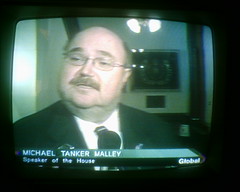
I gave him that nickname because he quit smoking months ago and we all know there’s nothing worst than an angry Parking commissionaire….lol…
I said to myself – I’m going to have some fun with this one!!!
I can be a pretty good actor if I want to???...lol…
I intervened in their chat and shouted – LETS GET ONE THING STRAIGHT RIGHT NOW!!!!
Tanker looked surprised by my attitude and said - What’s your problem????
I told Tanker that he’s the new Speaker of the House!!! 
He has to act like a speaker!!!
He has to play the roll like Bev Harrison < you know head high >
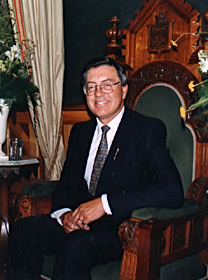
You don’t communicate with those peasants!!!!
You’re the Speaker of the House!!!
It was at that moment that they knew I was having some fun!!!
I took this picture and left. 
Yes….....this speaker who calls himself a People’s Person is still being open with the public. 
Not saying that Bev Harrison didn’t communicate with the public but this is truly different.
IF YOU'RE AGAINST THE PIPELINE? PHONE - 1 800 899 1265 ask for Michelle Luit
I called today and it would only take a few minutes.
You'll get a record message < surprise surprise surprise.>
After the recording is over? You can leave a message.
I was was stern and told the woman that I didn't expect a replisal.
This was a waste of time so I left my email address.
Hours later, I received this email -
National Energy Board
Information Sessions
The National Energy Board (NEB) is the federal agency that regulates interprovincial and international pipelines across Canada. You may have heard about the NEB in relation to pipeline projects that may be proposed in your region.
NEB staff will be hosting sessions to provide information about the Board’s mandate, the public hearing procedure and how you can participate. A brief presentation on the Board’s hearing process will be followed by an opportunity to ask questions.
Tuesday, 4 April 2006
Delta Brunswick Hotel
39 King Street, Saint John, NB
NEB staff will be available from 6 p.m. – 9 p.m. with presentations at 6:30 p.m. and 8:00 p.m.
For more information, please contact Michèle Luit or Carole Léger-Kubeczek at 1-800-899-1265, or visit our website at www.neb-one.gc.ca .
SO PUT UP OR SHUT UP!!!!
PHONE -
PHONE - 1 800 899 1265 ask for Michelle Luit
EVER WONDERED WHERE RITALIN CAME FROM???
I heard a story that Hitler ordered these pills to train his soldiers but I guess this is not true!!!!
Consumer Health
Ped Med: ADHD treatments then and now
By LIDIA WASOWICZ
UPI Senior Science Writer
SAN FRANCISCO, March 29 (UPI) -- The current reliance on drugs as a preferred treatment for childhood behavioral problems has its roots in an accident waiting to happen more than half a century ago.
On that day in 1937, a young psychiatrist named Dr. Charles Bradley, just five years out of his residency, noted a "spectacular change in behavior" in 14 of 30 children given Benzedrine for a week to ease headaches suffered from a painful and now obsolete medical procedure.
The chance discovery was the first clinical observation of the effect of stimulant medication on hyperactive children. It would alter the course of pediatric behavioral treatment, which at the time centered on talk therapy. The drug proved no analgesic for the children who, as part of their evaluation, had the cerebrospinal fluid drained from their brain and replaced with air for a clearer X-ray picture. However, in an unexpected turn, for some of the youngsters, it became the "arithmetic pill" that helped them settle into their schoolwork.
A quarter of a century would pass before anyone attempted to replicate the observations made by Bradley at the nation's first neuropsychiatric hospital for children, the Emma Pendleton Bradley Home -- now Bradley Hospital -- in East Providence, R.I. It would be another 25 years before stimulants took their place as a staple of treatments for attention-deficit/hyperactivity disorder.
Today, from among a multitude of options -- from numerous medications to behavior-changing strategies to educational approaches to combination therapies -- they are what the doctor orders most often.
Speedily producing dramatic effects, stimulants like Ritalin, Adderall and Concerta are the professionals' No. 1 choice for the estimated 2.5 million ADHD-diagnosed children managed with medication.
Recommended as a front-line drug treatment by such medical powerhouses as the American Academy of Pediatrics, psychostimulants nevertheless sport a Jekyll and Hyde persona.
On the one hand, studies attest to their ability to sharpen concentration and focus and dull impulsivity and rashness in 60 percent to 80 percent of children diagnosed with ADHD.
On the other, evidence exists of the devastation wrought by misuse of the potent narcotics, which the Drug Enforcement Agency classifies, along with opium and cocaine, as dangerously addictive and highly prone to abuse Schedule II controlled substances.
Even with appropriate application, the pharmaceuticals can raise the risks for a cascade of costly consequences, from stunted growth in some children who lose their appetite to psychosis in those whose existing mental illness worsens with treatment.
Earlier this month a Food and Drug Administration advisory committee was told of a small number of children suffering hallucinations of snakes, worms, bugs and other creepy crawlies after taking the drugs.
A preliminary FDA report released last month tentatively linked stimulant medications to deaths and cardiovascular and other serious problems in fewer than one case per million prescriptions written.
No causative relationship has been established in either case, but two panels of experts agreed parents, patients and physicians should be alerted to the potential risks in a tiny fraction of those treated with the drugs -- a risk the pharmaceutical companies say is about equal to that faced by the general population.
Equally varied are youngsters' responses to the medicines, which doctors often dole out on a trial-and-error basis, having to switch doses, then drugs, before fixing upon the right formula.
Specialists stress no definitive pattern of serious injury has emerged in the literature over the more than five decades compounds like Ritalin have been in use. However, critics note most of the studies have lasted no more than a few years so no one knows for sure just how helpful -- or harmful -- they may turn out to be for the growing number of children who take them for far longer.
"Stimulant trials (have) proven short-term efficacy and safety, (but) there are very few long-term safety and efficacy trials," noted Dr. John Walkup, deputy director of the Child and Adolescent Psychiatry Division at the Johns Hopkins Children's Center in Baltimore.
Used alone, the pharmaceuticals do not appear to offer long-range benefits, scientists say.
"They don't improve an ADHD child's outcome in adolescence and adulthood," said William Pelham Jr., distinguished professor of psychology and director of the Center for Children and Families at the State University of New York at Buffalo. He helped develop the medicines Concerta and Adderall and conducted numerous trials involving other ADHD stimulant drugs, including the initial testing of a new methylphenidate skin patch.
His studies, some funded by pharmaceutical companies, have shown behavior therapy in combination with drugs is the most effective treatment and lessens the risk of drug side effects.
"I remain concerned that the medications are used too frequently (nearly 5 percent of children in the United States are medicated with one of these drugs), at doses that are unnecessarily high (three times higher than needed), and for much too long a duration for most children (years rather than months)," Pelham said.
Rather, he advocates that behavioral therapy be used as the first-line treatment of ADHD.
"(Drugs) should be used as adjunctive treatments for children for whom behavioral treatments are insufficient, they should be used at the lowest possible dose, and they should be administered only as long as necessary," he advised.
Next: Coping with confounders.
(Editors' Note: This series on ADHD is based on a review of hundreds of reports and a survey of more than 200 specialists.)
--
UPI Consumer Health welcomes comments on this column. E-mail: lwasowicz@upi.com
BERNARD LORD DOES HAVE A SENSE OF HA HA!!!
FORMER PROVINCIAL JUDGE STYMIEST DREW AND COMPANY WILL BE SENTENCE FRIDAY!!!
I just heard on CBC radio that they all appeared in court and pleaded with the judge for House arrest.
I guess over 130 people showed up. From what I'm told? I guess that he was a very ignorant Judge.
Will justice prevail??? Lets watch and see!!!!
I still say that all past cases this convicted Judge was involded with should be investigated.
Miramichi hospital execs face sentencing
Last updated Mar 29 2006 08:58 AM AST
CBC News
Four prominent members of the Miramichi community will be sentenced Wednesday for defrauding the Miramichi Hospital of nearly a million dollars.
The men, including former provincial court judge Drew Stymiest, were convicted last February of 39 counts of fraud and breach of trust.
The Crown prosecutor has said he'll seek lengthy prison sentences for two of the men. Stymiest was found guilty of the most counts and will be sentenced for 20 charges. John Tucker, the former hospital president and CEO, was found guilty of 17 charges.
COME ON???? LEAVE US ALONE!!!!
I believe they have the same feeling as the MLA's in the Capital!!!!...lol
WITH QUEBEC NEW SECURITY BARRICADES? IT'S A NIGHTMARE FOR THE LIBERAL MLA'S TO PARK THEIR VEHICLES!!!!
MY DEEPEST SYMPATHY TO JEANNOT VOLPE!!!!
I've just learned a few hours ago that his Father has passed away! My sympathy to his family.
QUESTION PERIOD AT THE NEW BRUNSWICK LEGISLATURE!!!!! < Mercredi >
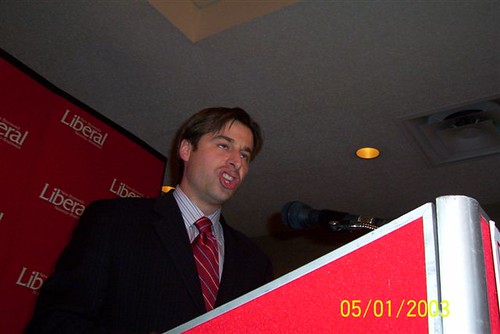

ORAL QUESTIONS 10 QUESTIONS ORALES
March 29, 2006 Not finalized / Non finalisé le 29 mars 2006
S:\HANSARD\HANSARD DAILIES - FASCICULES\2005-2006 55-3\14 2006-03-29 BL\14 2006-03-29 BL.wpd 1/15
016 10:10
Mr. S. Graham: With your indulgence, Mr. Speaker, this being the first day back since the
Christmas session, when we debated the capital budget, is it appropriate that we have extra time
allotted for question period today, with the indulgence of the government?
Hon. Mr. Lord: Mr. Speaker, on that point, absolutely. We would be more than happy to extend
question period. I think our tradition is to extend it by 15 minutes. We would be more than happy
to do that.
Mr. Speaker: All agreed?
Hon. Members: Agreed.
Mr. S. Graham: We are starting off on a good first step this morning. I appreciate that.
Power Rebates
My question is for the Premier this morning. Over the past number of months, ratepayers have been
hit with an approximate 9% increase in power rates. This year, ratepayers were told by this
government to prepare for another potential 13% increase in power rates that are currently before
the Public Utilities Board. The initial position of government was: New Brunswick must prepare for
the increases. Now the government has changed its position and has agreed with the Liberal Party
that New Brunswick citizens are not prepared at this time for rate shock. I want to commend the
Premier this morning on his initiative in yesterday’s budget for the elimination of the provincial
portion of HST of 8% on electricity bills. In fact, I would remind this House of a resolution adopted
at our party’s recent biannual convention which recommended the same action.
My question to the Premier this morning pertains to the new program. Can he confirm that this is
a one-year program or a permanent program of his government?
Hon. Mr. Lord: I appreciate the question, and I would refer the Leader of the Opposition to the
speech from the throne. We stated clearly in the speech from the throne that, this year, we would be
adopting measures to help citizens deal with the increased energy costs. This is a permanent
measure. We have cut taxes in the past. We have cut taxes in this budget. We will continue to cut
taxes in the future. We have eliminated the HST from electricity and from home heating fuels, which
include propane, natural gas, wood, and kerosene. For whatever people need to heat their homes,
there will be no HST.
ORAL QUESTIONS / QUESTIONS ORALES
March 29, 2006 Not finalized / Non finalisé le 29 mars 2006
S:\HANSARD\HANSARD DAILIES - FASCICULES\2005-2006 55-3\14 2006-03-29 BL\14 2006-03-29 BL.wpd 2/15
Mr. S. Graham: The design of the program, as the Premier has announced it, seems to be flawed
in the sense that it is a rebate program. The ratepayers of New Brunswick have to apply to
government. Our concern today is that we are creating a new bureaucracy. What we are
recommending is a rebate at source. Why create a new bureaucracy? Is there a potential for NB
Power, which covers 60% of the electricity costs in New Brunswick . . . Homeowners can rebate at
source. We are asking that the Premier commit to the idea that we are proposing, where you rebate
at source instead of having to apply cumbersome paperwork. Also, traditionally, low-income New
Brunswickers do not fill out the necessary paperwork. Can we create an at-source rebate program?
Hon. Mr. Lord: I am very happy to address this question, because it is a good question on how the
people of New Brunswick will benefit greatly from this rebate. It is our intention to do it at source
with NB Power. We cannot guarantee that we can do it at source with the other providers of home
heating fuels. We will do our best to do it. If not, a rebate program will be set up. The important
thing is that the people of New Brunswick will benefit from an 8% rebate of the HST on home
heating fuels.
Mr. S. Graham: I would like to remind the Premier, though, that he is taking our recommendation
this morning, and I appreciate that. The bottom line is that we need to get a clear commitment from
the Premier this morning that New Brunswick citizens will not have to apply for a rebate off their
electricity bill and that the rebate will be incorporated on the electricity bill.
Hon. Mr. Lord: I am very pleased that, this morning, we are in heated agreement in this House.
Therefore, I can assure the Leader of the Opposition and the members of this House that our
intention is to provide the rebate at source. Of course, I agree, and it is our contention that it is more
efficient to do it directly through NB Power. That is what we intend to do.
With regard to the other sources of home heating fuels, we will have to negotiate and see what we
can do. If we cannot agree with the large providers, a rebate system will be set up where people will
get a cheque back for the HST that they would pay.
017 10:15
Mr. S. Graham: I am sure the Premier will agree that we are off to a good start this morning. We
are asking the pertinent questions, and we are receiving the appropriate answers. We appreciate that.
My next question to the Premier is this: The PUB may determine that burning Bunker C versus
Orimulsion does cost NB Power more, and a 13% rate increase is required. We are not talking about
the 8% HST rebate, we are talking today about the cap that your government has announced. In fact,
your government has changed its position by intervening prior to the PUB making a final decision
by announcing this 8% cap. Can you announce today how much each percentage point beyond the
8% cap represents in a dollar value to the taxpayers of New Brunswick?
ORAL QUESTIONS / QUESTIONS ORALES
March 29, 2006 Not finalized / Non finalisé le 29 mars 2006
S:\HANSARD\HANSARD DAILIES - FASCICULES\2005-2006 55-3\14 2006-03-29 BL\14 2006-03-29 BL.wpd 3/15
Hon. Mr. Lord: I want to address the first part of the question as to why the government decided
to announce its position this Monday, prior to the PUB rendering its decision. The reason is that
those numbers needed to be included in the budget. I stated very clearly that if the PUB decides that
NB Power does not need an 8% increase, or more, if it decides that 7% or 6% is sufficient, then the
increase will be whatever the PUB determines. If it is more than 8%, it will be capped at 8%. In our
budget, approximately $46 million is set aside to cover the projected maximum losses to the New
Brunswick Electric Finance Corporation, if the rate is capped at 8%, versus what NB Power asks
before the PUB.
Mr. S. Graham: The question that I asked the Premier indicated that $46 million is budgeted as a
loss to the Electric Finance Corporation. The question I asked is this: How much does each
percentage point above the 8% cap cost the New Brunswick taxpayers? We need a breakdown by
percentage point.
Hon. Mr. Lord: I would be happy to provide that information to the Leader of the Opposition. The
general rule of thumb that we have been using is about $10 million to $12 million per percentage
point. I will be happy to provide more accurate information to the Leader of the Opposition. I will
do that as quickly as possible.
Mr. S. Graham: We would appreciate receiving that information, because after 55 days of hearings
and a $4-million cost to the taxpayers of New Brunswick, the PUB went through an extensive
process. We, on this side of the Chamber, have agreed that the powers of the PUB need to be
enhanced. In fact, the member for Saint John Champlain appeared before the PUB to make such a
recommendation. In the past, this province has been accustomed to a 3% rate increase, year over
year. Now, this government is standing up today and applauding itself for an 8% rate increase and
a 9% increase that occurred prior to this.
New Brunswickers are seeing rate shock in the sense that on April 1, 2004, there was a 2.5%
increase. On March 31, 2005 there was a 3% increase, and on July 7, there was a 3% increase. Your
government did not allow the PUB to review this increase at that time. Now, you are flip-flopping
your position. You are saying that we need to have more authority for the PUB. New Brunswickers
are concerned about the change in position, but we want to make sure, at the same time, that the
provincial taxpayers are protected as well.
My question to the Premier today is this: Where is this budgeted in the actual budget document?
Yesterday, when your staff met with the officials in our department, they could not pinpoint with
clear accuracy where the $100-million initiative was budgeted.
Hon. Mr. Lord: There are a lot of things in that question, and I want to address every single one
of them. Our position has been very clear about having an open and transparent process. That can
be found in the 2001 energy policy of the government of New Brunswick. Every single increase that
was applied before was less than 3%. We actually changed that a few years ago. When the Liberals
ORAL QUESTIONS / QUESTIONS ORALES
March 29, 2006 Not finalized / Non finalisé le 29 mars 2006
S:\HANSARD\HANSARD DAILIES - FASCICULES\2005-2006 55-3\14 2006-03-29 BL\14 2006-03-29 BL.wpd 4/15
were in office, it was an average of 3%, while we set a maximum of 3% for every category of user.
NB Power had not appeared before the PUB since the early 1990s. Clearly, it was too long. That is
why I announced this week that, regardless of the rate increases requested by NB Power in the
future, it will need to appear before the PUB at least every three years.
018 10:20
With regard to the $100 million, it is very simple. We have budgeted a loss of the Electric Finance
Corporation that is worth about $46 million. The HST rebate, providing energy relief on all sources
of energy, is worth about $45 million this year. An amount of about $11.9 million is budgeted for
the Efficiency New Brunswick Agency to help people make better choices, and a sum of about $4.8
million is in the Department of Family and Community Services, to help ease heating costs for lowincome
New Brunswickers. If you add all that up, it is far more than $100 million.
Mr. S. Graham: I think maybe the Premier should have been at the budget briefing yesterday,
rather than the staff of the departments, because that explanation was not given yesterday.
I would like to point out to the Premier that now, all of a sudden, there is a change in position, and
the PUB requires greater accountability by forcing NB Power to appear before it every three years.
It was this government that allowed two rate increases to go through in the same fiscal period,
because of a change in your legislation under the Electricity Act that circumvented the PUB. Why
the change of heart now? Why did you not force the PUB to review the rate increase at that point
in time?
Hon. Mr. Lord: The Act was followed at the time, and it was fully respected. It was an Act that was
passed by this Legislature. With the measures that we are taking, for the residential consumers of
New Brunswick, there will effectively be no rate increase next year. That is the important element.
We have taken measures to address this very important concern of New Brunswickers. We have
listened to the concerns of New Brunswickers. We have heard their message, and that is why we
have taken this extraordinary measure of $100 million in tax relief—not just relief, but relief for the
people of New Brunswick.
Mr. S. Graham: Certainly, the Premier and I are in agreement this morning that rate shock was
going to have a negative impact, because I remember the headlines. The Premier was saying that
New Brunswick must prepare for the increase. Today, the government members have changed their
position, and we applaud them on that, because a potential 13% increase in one fiscal period,
coupled with a 9% increase last year, was too much. We were hearing that message loud and clear,
and it seems the government has now heard that message.
My question to the Premier pertains to the recent report of the Auditor General.
ORAL QUESTIONS / QUESTIONS ORALES
March 29, 2006 Not finalized / Non finalisé le 29 mars 2006
S:\HANSARD\HANSARD DAILIES - FASCICULES\2005-2006 55-3\14 2006-03-29 BL\14 2006-03-29 BL.wpd 5/15
Le vérificateur général a récemment dit qu’il est nécessaire d’avoir une ligne de contact directe pour
savoir qui est responsable d’Énergie NB. En ce moment, il y a la ministre de l’Énergie, le ministre
des Finances et le Bureau du premier ministre. La question que je poserai au premier ministre ce
matin est très simple.
Has the Premier’s Office become the official spokesperson for NB Power following this week’s
announcement?
Hon. Mr. Lord: First of all, I want to state some facts. There was no 9% increase last year, and I
would be happy to do a briefing as well, if that is what the Leader of the Opposition wants. There
were 3% increases every year, and there was a 2.9% additional increase last year, but there was no
9% increase, so I don’t know where the Leader of the Opposition gets those numbers.
The Premier’s Office is not in any way the spokesperson for NB Power, so the answer to that
question is simply no.
Mr. S. Graham: I don’t want to get hung up on dates with the Premier this morning, but on April
1, 2004, there was a 2.5% increase. On March 31, 2005, there was a 3% increase because of a
change in the Electricity Act that allowed the two increases to go through in the same fiscal period.
Then, on July 7, 2005, there was another 3% increase. Over the past number of months, I had said,
there was an increase of approximately 9%.
My question to you, though, is not on the rate increase, because that has been put through. My
question is this: The Auditor General has clearly outlined that NB Power has three masters, and
because of the three masters, it is very difficult to determine who is responsible for the actual
direction of our utility. The government is the only shareholder of NB Power. My question to you
this morning, Mr. Premier, is: How have you addressed the Auditor General’s concerns? Is it done
through the Office of the Premier, since the announcement that was made this week gives an
indication that it is? Is it through the office of the Minister of Energy, or is it the Minister of Finance
who is the main line of communication responsible for addressing the Auditor General’s concerns?
Hon. Mr. Lord: As Premier of New Brunswick and as head of the government, I certainly reserve
the right to state government policy on behalf of the government. I have done it on many occasions,
not just on energy. I have certainly done it on education. I have done it with the Minister of Health
on health care. We did it on roads last week, and I am happy to do that.
With regard to the link between government and NB Power, that link is maintained by the
Department of Energy and the Minister of Energy.
019 10:25
NB Power
ORAL QUESTIONS / QUESTIONS ORALES
March 29, 2006 Not finalized / Non finalisé le 29 mars 2006
S:\HANSARD\HANSARD DAILIES - FASCICULES\2005-2006 55-3\14 2006-03-29 BL\14 2006-03-29 BL.wpd 6/15
Mr. Burke: I have a question for the newly anointed Minister of Energy. For that, I made sure my
power bill was paid.
Just two days ago, the Premier—not the Minister of Energy—announced plans for a feasibility study
of a second reactor at Point Lepreau. Just five months ago, the former Minister of Energy indicated
that this plan, announced by the Liberal opposition, was irresponsible, blatantly political, and on the
eve of the Saint John Harbour by-election. Now, with the potential spring election looming, this
government has taken a dramatic shift in policy by announcing the very same thing. Obviously, the
Liberal initiative was a good one. You just need an election to make you believe it.
Can this minister inform the House why such a dramatic overnight shift in policy?
Hon. Ms. Fowlie: In my previous discussions with the former Minister of Energy, what he was
actually talking about was the location the Leader of the Opposition chose to make that
announcement. As for the member for Fredericton North saying it was a Liberal idea, again, as I said
on CBC the other morning, it was Richard Hatfield’s idea. I have never considered Richard Hatfield
to be a Liberal.
Mr. Burke: That begs the question—I guess Richard Hatfield’s ideas are irresponsible and blatantly
political.
There is a starving import market in New England for energy, and we have an opportunity to provide
low-cost, high-price electricity at a profit. This profit could mean a debt reduction and savings for
ratepayers when they need it most. New Brunswickers cannot afford this government to, once again,
make announcements and do nothing. As New Brunswickers have recently seen again, this is a donothing
government that does everything in anticipation of an election.
My first supplementary question to the Minister of Energy is this: When will this government
engage the necessary experts to complete the feasibility study of the second reactor? New
Brunswickers want deadlines for action, not scripted messages from her spin doctors.
Hon. Ms. Fowlie: While I recognize that the members of the opposition want definite time frames,
and so forth, this will be a review done by the Department of Energy, the Department of Finance,
and NB Power to look at the potential feasibility. While I recognize the members in opposition
would like to see New Brunswick generating all the power and taking all the risks on the
shareholders and taxpayers of New Brunswick for future development of energy in this province so
that they can sell it all to the United States, we intend to take a more practical approach. What we
are planning on doing is ensuring that New Brunswickers have safe, reliable, and secure power.
Mr. Burke: We hope that when the Minister of Energy and this government engages those
necessary experts, that they ensure the contract is signed.
ORAL QUESTIONS / QUESTIONS ORALES
March 29, 2006 Not finalized / Non finalisé le 29 mars 2006
S:\HANSARD\HANSARD DAILIES - FASCICULES\2005-2006 55-3\14 2006-03-29 BL\14 2006-03-29 BL.wpd 7/15
Smart Metering and Net Metering have become popular trends in Canada and in the United States
for ratepayers to conserve energy consumption during non-peak times. Yet, in yesterday’s
announcement in the budget, and two days of announcements of this new energy plan that the
Premier made, nothing points to these conservation methods. My second supplementary is, What
is the Minister of Energy doing today to conserve energy prices for the people of New Brunswick?
Hon. Ms. Fowlie: If the member opposite had taken the opportunity to read the energy policy and
the Electricity Act, he would recognize that we do recognize that Net Metering is a potential way
in the province to get electricity back into the grid. You see, what we are doing over here is taking
a systemic approach to ensuring a safe and reliable supply of electricity. What the members opposite
are trying to do is just create headlines. We believe in moving New Brunswick forward. As we have
shown in our budget, we are not a government of inaction. We have had seven years of consistent
progress. I find it highly entertaining that the members opposite are saying that these are all their
ideas in the budget, and, at the same time, their leader is saying that they do not support the budget.
Obviously, they do not support their own leader’s ideas.
020 10:30
Éducation
Mme C. Robichaud : Ce matin, mes questions s’adressent au ministre de l’Éducation. Plus tôt ce
mois-ci, Wayne MacKay a présenté son rapport sur l’inclusion scolaire au Nouveau-Brunswick.
Avec ses 95 recommandations, le travail de M. MacKay nous indique clairement le chemin que nous
devons suivre pour nous assurer que tous les élèves des régions rurales et urbaines du Nouveau-
Brunswick reçoivent l’éducation de qualité qu’ils ont besoin et qu’ils méritent. Le budget d’hier
comprend très peu de mesures concrètes pour répondre à ces recommandations. Le budget comprend
un engagement de 5 millions de dollars pour la composition de salles de classe. Le ministre de
l’Éducation peut-il m’expliquer à quoi servira cet argent exactement et comment ce montant sera
réparti?
L’hon. M. Williams : Cela me fait plaisir de répondre à la question de la députée. Tout d’abord, elle
fait référence au budget au rapport MacKay. Je pense que le montant de 5 millions est un bon départ,
et on va discuter des mesures à prendre au mois de mai. Je pense que la députée n’a peut-être pas
compris, mais le gouvernement a déjà réagi aux recommandations du rapport MacKay. Entre autres,
un comité ministériel étudiera l’intégration des services, et il y aura un forum les 28 et 29 mai. Je
le répète cela prendra place au mois de mai, dans un mois précisément. Je pense que ce sont des
mesures concrètes, et ce sont des actions qui ont été énoncées dans le budget d’hier. Depuis l’an
dernier, 2,5 millions sont affectés pour traiter de la composition de la classe et de l’inclusion. Donc,
le budget d’hier fait état de mesures et des actions concrètes que ce gouvernement mettra de l’avant.
Je pense que, si la députée relit ce qu’il y avait dans le budget d’hier, elle comprendra.
ORAL QUESTIONS / QUESTIONS ORALES
March 29, 2006 Not finalized / Non finalisé le 29 mars 2006
S:\HANSARD\HANSARD DAILIES - FASCICULES\2005-2006 55-3\14 2006-03-29 BL\14 2006-03-29 BL.wpd 8/15
Mme C. Robichaud : J’entends qu’on aura encore d’autres discussions, mais je n’entends pas
comment on dépensera cet argent exactement et ce qu’on fera avec des dates butoirs et concrètes.
M. MacKay recommande que, au cours de la première année suivant le dépôt de son rapport, le
ministère de l’Éducation devrait réduire le ratio de 1 enseignant-ressource pour 200 élèves de la
maternelle à la 8e année. Le ministre peut-il m’expliquer pourquoi ce gouvernement a rejeté cette
recommandation?
L’hon. M. Williams : Le montant de 5 millions qui a été annoncé pour traiter des recommandations
du rapport MacKay… C’était clair que la recommandation était de parler avec nos partenaires et
les intervenants pour justement discuter de ces recommandations et établir un plan stratégique. Si
l’opposition parlait comme elle le faisait par le passé, elle aurait dit : C’est comme ceci et c’est
comme cela. De notre côté, nous avons écouté les 700 personnes qui ont rencontré M. MacKay.
Nous avons écouté les différentes associations et les personnes qui ont soumis des documents. Elles
nous ont demandé de s’asseoir avec nous afin de travailler aux recommandations. Hier, le
gouvernement a annoncé 5 millions, justement, pour aborder la question de l’éducation. Donc, je
pense que nous sommes à l’écoute des gens du Nouveau-Brunswick. Nous sommes là pour travailler
avec eux afin de mettre en place les recommandations pour améliorer la qualité de l’éducation pour
les jeunes du Nouveau-Brunswick. C’est que nous avons fait, et c’est ce que nous allons continuer
à faire.
Mme C. Robichaud : Est-ce que j’entends le ministre me dire que, immédiatement en septembre,
ces recommandations seront mises en place? Depuis deux ans, on entend que M. MacKay est allé
partout dans la province pour écouter les recommandations des personnes. Au cours de la première
année suivant le dépôt de son rapport, M. MacKay recommande que le gouvernement augmente le
nombre de spécialistes, d’orthophonistes, d’infirmières scolaires, de travailleurs et de psychologues.
Quand on parle de la première année, cela veut dire au mois de septembre.
021 10:35
Le ministre peut-il m’expliquer pourquoi le gouvernement a rejeté cette recommandation lors de
l’élaboration de son budget?
L’hon. M. Williams : On a annoncé un montant de 5 millions de dollars dans le budget qui sera
investi dans les salles de classe dès septembre 2006. Il y aura 240 nouveaux enseignants en salle de
classe dès septembre 2006. Ce sont des investissements qui sont faits cette année. On a annoncé un
fonds spécial de 2,5 millions. Ce sont des investissements qui font partie du budget de cette année
et qui ont pour but de traiter de la composition de la classe. C’est pour cette année ; c’est dans le
budget de 2006-2007.
Donc, en réponse à la députée de Baie-de-Miramichi, ce sont des actions concrètes. C’est de l’argent
qui est mis dans le budget, et on a certainement l’intention d’investir cet argent au cours de l’année,
c’est-à-dire dès septembre 2006.
ORAL QUESTIONS / QUESTIONS ORALES
March 29, 2006 Not finalized / Non finalisé le 29 mars 2006
S:\HANSARD\HANSARD DAILIES - FASCICULES\2005-2006 55-3\14 2006-03-29 BL\14 2006-03-29 BL.wpd 9/15
Mr. Lamrock: If this minister is satisfied with an increase that is less than the rate of inflation, he
is way too happy to accept mediocrity for our kids. On page 338 of the McKay report—which,
unlike the minister and his scrum, I have read—Dr. McKay says very clearly: “Students with
learning disabilities and other milder needs, particularly if they are not disruptive in class, are often
at the bottom of the priority list and in some cases receive no support services at all”. That is what
this report told the minister was the status quo. What have we gotten? Has he been standing up to
invest now so we do not pay more for these kids later? Has he been standing up to develop their
potential? Instead, we have an increase that is less than the price of gas.
This report calls for a resource review to be done within six months. To meet those new resource
needs in this fiscal year, you would need an increase above the rate of inflation. You do not have
it. My question to the minister is this: If we are to take you seriously, why did you ignore the very
first deadline that Dr. McKay put in place to help our kids, who are crying out, right there in your
own report?
L’hon. M. Williams : Je veux mentionner au député de Fredericton-Fort Nashwaak que le
gouvernement investit cette année 7 243 $ par élève, alors que, en 1999, le montant était de 4 881 $.
On sait tous qu’il y a eu une diminution du nombre d’élèves. Donc, l’investissement fait par le
gouvernement a augmenté d’environ 50 %. Je pense que le gouvernement est très sérieux et qu’il
a à coeur l’éducation de nos enfants. C’est un priorité et cela le demeurera. On traite de la
composition de la classe avec 240 nouveaux enseignants, et ce, dès septembre 2006. Ce sont là des
actions concrètes du gouvernement.
Mr. Lamrock: Of course you have spent more dollars. It is called inflation. If this minister thinks
that it is enough to do the job, why, seven years in, do we have a report which says that there are
kids in our system with learning disabilities who receive no help at all? If you have spent enough,
you cannot explain that.
Let us look at the facts. For two straight years, in the public accounts committee, the Deputy
Minister of Education has told us that every single school district is receiving less money from this
government for special needs education than it is actually spending. That means that just to try to
stay afloat and meet the mediocrity that this minister accepts way too easily, school districts are
having to cut other areas. If the minister really believes that he got enough at the Cabinet table, if
he is really a fighter for our kids, let him name one school district which, in this year’s allocation,
will get as much for special education as it actually spent last year. Name one, because with this rate,
you cannot, and you know it.
L’hon. M. Williams : Cette année, en septembre 2006, il y aura 650 enseignants additionnels. C’est
au-delà de ce que proposait le Plan d’apprentissage de qualité, soit 625 nouveaux enseignants pour
septembre 2007. Donc, nous avons dépassé nos engagements. Il y aura 650 enseignants de plus dans
le système. Depuis 1999, on a ajouté 614 aides-enseignants.
ORAL QUESTIONS / QUESTIONS ORALES
March 29, 2006 Not finalized / Non finalisé le 29 mars 2006
S:\HANSARD\HANSARD DAILIES - FASCICULES\2005-2006 55-3\14 2006-03-29 BL\14 2006-03-29 BL.wpd 10/15
022 10:40
Le rapport MacKay fait partie du Plan d’apprentissage de qualité. Nous avons reçu des
recommandations et nous allons travailler avec les différents intervenants, justement pour regarder
aux recommandations, et, avec le montant de 5 millions, nous allons certainement aborder les
situations dans le système scolaire. Tout cela pour une meilleure éducation pour nos enfants.
Mr. Lamrock: Let the record show that this minister cannot name one district which will get, in this
year’s budget, even what it spent last year on special education, even though this minister’s own
report tells him that there are kids with learning disabilities who are getting no help. Those tragedies
are unfolding right in front of this minister’s eyes. He is repeating spin, while we are letting kids
with learning disabilities, who cannot learn to read, who cannot learn to add, who are losing selfesteem
and confidence, fall through the cracks. His own report! He knows that is the status quo. He
knows he has maintained the status quo, and he just gives us spin. That is the bleating lamb we have
fighting for our kids at the Cabinet table.
If he believes he has done so well, let’s read this very report. On page 329, there is a very clear
recommendation which says New Brunswick should increase its per capita funding per student to
bring it to the middle rank of Canadian provinces. Your own report says that you would have to run
faster just to be mediocre, just to get to the middle of the pack. Let’s see if this minister can give us
something other than spin. If you are really going to fight, do you accept the goal of at least trying
to get to the middle of the pack in the Canadian provinces? If so, give us a deadline of when you are
prepared to do it—not defend it, but demand it.
Hon. Mr. Williams: If $37.5 million, an increase of 4.4%, is spin, well, let’s call it spin, but it is
actual money. That is actual money that we will be investing in education. Whatever the opposition
members want to call it, at least we have done better than they did when they were in government.
We are investing in education. We have been doing that since 1999. Look at what we spend per
student in the schools for teachers and teacher aides.
Nous n’avons pas de leçon à recevoir de la part des parlementaires du côté de l’opposition. Ce que
nous avons mis en place, c’est quelque chose de concret. Je peux vous dire que l’opposition n’a rien
à critiquer en ce qui a trait aux 35 millions de dollars. Nous avons fait de bons investissements et
nous allons continuer. Je pense que le système d’éducation est content de ce que nous avons mis en
place pour septembre.
Saint John Harbour
Mr. Jamieson: My question is for the Minister of the Environment. For seven years, this
government has done very little to protect the environment of New Brunswick with new initiatives.
For seven years, the Lord government has done very little for the city of Saint John. It is actually
very difficult to say what this government has done or to point to any project in Saint John that it
ORAL QUESTIONS / QUESTIONS ORALES
March 29, 2006 Not finalized / Non finalisé le 29 mars 2006
S:\HANSARD\HANSARD DAILIES - FASCICULES\2005-2006 55-3\14 2006-03-29 BL\14 2006-03-29 BL.wpd 11/15
has initiated. Now, the government seems very happy to brag about $2.8 million that it may put into
harbour cleanup, although nothing has been signed. Where has the government been for seven
years? Where is the government with this amount of $2.8 million? Is the Minister of the
Environment really happy with his own government, knowing that is all the money it is going to
give to the city of Saint John for this project? That is all it has put into this project. Is that what you
are doing to fight for the people of Saint John? That is it?
Hon. Mr. Holder: This has been a priority of the city of Saint John for many years now. Last Friday
afternoon, for the first time, we got some real dollars on the table. The Prime Minister, the Premier,
and the mayor stood on the stage and committed $8.5 million for the initial phase of this project. We
have a clear agreement from the Prime Minister that once the federal budget is over and it gets
through that process, we are going to sit down and figure out the details of a long-term funding
agreement for this project.
Mr. Jamieson: It certainly was not a priority of this government until the last by-election in Saint
John. The citizens of Saint John spoke very loudly about your initiatives in Saint John. You lost
every poll in Saint John. Excuse me, you tied one poll. We have to give you that. This is a major
infrastructure requirement that is needed in Saint John.
023 10:45
It is needed to build a sewage treatment plant. What is needed is $47 million, because $2.8 million
is not even enough to build a lift station for this project. When Stephen Harper came to Saint John,
he spent more money getting to Saint John than he gave the city to help with this project. For this
government to say, in its budget, that this is enough to address the problem does not really meet the
requirements of the people and of the mayor of the city of Saint John. You gave more money to a
brewery in Moncton. You gave them $5 million. What did you give to the city of Saint John in the
last seven years, Mr. Premier? Nothing.
(Interjection.)
Mr. Jamieson: I will get you up, for sure.
Hon. Mr. Lord: I am sure that question was for me. I am happy to answer this, because I have been
in Saint John over and over again, delivering our commitments to the city of Saint John. Through
the work we have done with the city of Saint John, with the business community, we have made
Saint John one of the best places in Canada in which to invest and do business. Saint John is
becoming an energy hub for Atlantic Canada. This is good news. There are more jobs in Saint John
today than at any time during which the member for Saint John-Fundy sat on the government side.
That is good news.
ORAL QUESTIONS / QUESTIONS ORALES
March 29, 2006 Not finalized / Non finalisé le 29 mars 2006
S:\HANSARD\HANSARD DAILIES - FASCICULES\2005-2006 55-3\14 2006-03-29 BL\14 2006-03-29 BL.wpd 12/15
We talk about harbour cleanup. Our government is committed to a 50-25-25 agreement. Our
government is committed to $20 million for that project. I will add that I will certainly welcome the
question from the man who could not deliver, because it was in the 1995 Liberal Party platform that
that party would fix harbour cleanup. It has provided zero funding.
Mr. Jamieson: There is more untreated sewage coming from this government than money can fix,
let me tell you.
This government never applied for infrastructure funding from the federal government. When it did
come, just before the by-election, you said: Oh, yes. There is need for money in Saint John for
harbour cleanup. There is a by-election, and we are interested. That is the first time the Premier was
ever interested. The federal government said: Here is $44 million, Mr. Premier. What did you do?
You did not even go for it, because of your political interests here in the Fredericton area, and your
thoughts that you might get to Ottawa.
The question is: Why did you not take the money offered by the federal government? This is to the
Minister of Environment. He is from Saint John, let him answer some questions for a change. Why
did you not take the money offered by the federal government, instead of the just $2.8 million that
you got?
Hon. Mr. Lord: Thank you. There is a simple answer to that why, why, why question. It was never
offered by the federal Liberals. There was never one cent from the federal Liberals.
Mr. Speaker: Order. Order, please.
Hon. Mr. Lord: I have to say that I am very pleased that we have a new working relationship with
the new federal government, which will bring millions of dollars to this province—millions of
dollars for harbour cleanup, millions of dollars for infrastructure, and hundreds of millions of dollars
for roads in New Brunswick. We will get things done with our partners in progress in Ottawa.
Highways
Mr. Allaby: Thank you. On page 21 of the budget, there is a ten-year $400-million highway deal
cited, as announced last week by the Prime Minister.
(Interjection).
Mr. Speaker: Order.
Mr. Allaby: Is there any money in this budget for this deal? Will the Minister of Transportation
answer the question? Is there any money in this budget for this $400-million deal?
ORAL QUESTIONS / QUESTIONS ORALES
March 29, 2006 Not finalized / Non finalisé le 29 mars 2006
S:\HANSARD\HANSARD DAILIES - FASCICULES\2005-2006 55-3\14 2006-03-29 BL\14 2006-03-29 BL.wpd 13/15
L’hon. P. Robichaud : Je suis vraiment fier de répondre à cette question, tout comme j’étais très
fier de participer à l’annonce que notre premier ministre et le premier ministre du Canada,
Stephen Harper, ont fait, ici, à Fredericton. En effet, il s’agit de 400 millions de dollars pour
notre réseau routier national au Nouveau-Brunswick.
Notre gouvernement passera à l’histoire comme étant un des seuls gouvernements qui auraient
pu signer deux ententes significatives, soit une entente sur la Transcanadienne et une entente sur
le réseau routier national, soit deux ententes de 400 millions de dollars chacune.
Comme le député d’Îles-de-Fundy le sait probablement très bien, l’annonce qui a été faite
vendredi dernier, en est une que les deux premiers ministres ont faite. Ces derniers ont donné le
mandat, à moi, comme ministre des Transports du Nouveau-Brunswick, ainsi qu’à mon
homologue, le ministre de Transports Canada, Lawrence Cannon, de négocier les détails de cette
entente.
024 10:50
D’ailleurs, je suis très heureux d’annoncer à la Chambre que, dès lundi prochain, je serai à
Ottawa pour rencontrer le ministre Lawrence Cannon, afin de parler de l’entente qui a été
annoncée. Nous prévoyons que l’argent du gouvernement fédéral sera disponible pour cette
entente dès le printemps 2007.
Mr. Allaby: The minister has confirmed . . . As I look through the budget, I see absolutely no
dollars for this $400-million deal. The minister has just confirmed that he has no money in this
budget for this deal. This has been a great photo op for the Prime Minister and for the Premier,
but there is no real money. There are no roads being built on this budget this year. It is 10 years
out. Will the minister confirm and answer for the record that there is no money in the budget for
this deal?
L’hon. P. Robichaud : L’annonce de vendredi n’est pas différente de l’annonce à laquelle le
premier ministre a participé avec le premier ministre Chrétien au sujet de la route à quatre voies.
Il y a un délai entre l’annonce qui est faite et l’entente qui est signée. Nous allons procéder
maintenant aux négociations et signer les détails de l’entente. Le député sait très bien que le
budget de dépenses de capital du ministère des Transports a été déposé à la Chambre le 23
décembre dernier. D’ailleurs, dois-je rappeler au député que c’était un budget record de 242,8
millions de dollars? C’est du jamais vu dans l’histoire du Nouveau-Brunswick, sans compter ce
que nous investirons pour la route à quatre voies et ce que le consortium investira au Nouveau-
Brunswick cette année.
Donc, je pense que les gens du côté de l’opposition devraient se satisfaire, comme la majorité de
la population du Nouveau-Brunswick, en ce qui a trait à la construction de routes qui sera
effectuée au Nouveau-Brunswick en 2006. Nous allons peaufiner les détails de l’entente, et
ORAL QUESTIONS / QUESTIONS ORALES
March 29, 2006 Not finalized / Non finalisé le 29 mars 2006
S:\HANSARD\HANSARD DAILIES - FASCICULES\2005-2006 55-3\14 2006-03-29 BL\14 2006-03-29 BL.wpd 14/15
lorsque celle-ci sera terminée, cela nous fera plaisir de débuter les travaux avec les 400 millions
qui ont été annoncés vendredi dernier par le premier ministre Harper et le premier ministre Lord.
Mr. Allaby: Will the minister outline for the House how many years we have to wait before we
actually see roads being built under this new deal?
Hon. P. Robichaud: Is there a question for me? Thank you very much, Mr. Speaker.
Nous sommes très fiers de l’annonce. Je pense qu’il s’agit simplement de la jalousie de la part
des parlementaires du côté de l’opposition de la jalousie. En effet, lorsqu’ils étaient au pouvoir,
ils n’ont jamais été capables de signer quelque entente que ce soit, pour quelque route que ce soit
au Nouveau-Brunswick. De notre côté, nous avons réussi à signer deux ententes qui représentent
au-delà de 800 millions pour les routes du Nouveau-Brunswick. C’est un exploit que les
Libéraux ne pourront jamais se vanter d’avoir accompli.
Government Funding
Mr. Arseneault: My question is for the Minister Responsible for RDC. If I look at the 2005
annual report, I notice that there are two funds. One, in the Miramichi, is worth $5 million, yet
only $2 million was spent. As well, there was the Restigouche-Chaleur fund; a total of $5
million was committed there, yet only $2.7 million was spent, so there was a lot of money left on
the table.
My question is this: Yesterday, during the budget speech, you recommitted to another $15
million for the upcoming year. I want to know whether this is rhetoric or whether you actually
have plans to spend the money.
Hon. Mr. Lord: If the member for Dalhousie-Restigouche East wants to know what rhetoric is,
let’s look back to when the Liberals announced $1.5 million for the whole north of New
Brunswick—$1.5 million, and they did not spend it. In contrast with that, we have put in place
$19 million just for the northeast since we have been in office. We are investing that money, and
that money is there, and as long as I am the Premier of New Brunswick, we will invest to create
more jobs in northeast New Brunswick. We have record jobs in northeast New Brunswick. We
have fewer people on social assistance, and we have just begun, because there is more work to
be done for the people of northeast New Brunswick.
Mr. Arseneault: Mr. Premier, I think you forgot another sentence: More people are leaving for
Alberta. You forgot that one. It is easy to commit, but the problem is, you are not spending
enough money.
ORAL QUESTIONS / QUESTIONS ORALES
March 29, 2006 Not finalized / Non finalisé le 29 mars 2006
S:\HANSARD\HANSARD DAILIES - FASCICULES\2005-2006 55-3\14 2006-03-29 BL\14 2006-03-29 BL.wpd 15/15
What I do see is the same trend I was seeing months prior to the June 2003 election. It is the
same thing; you are piling up the money. My question for you is this: When will New
Brunswickers see the slush fund that you have prepared for the upcoming election?
025 10:55
Hon. Mr. Lord: I know the member opposite really wants negative news for his region. I am
sorry to disappoint him, but things are moving in the right direction in northeast New Brunswick.
There are more people working in northeast New Brunswick today than when we were elected.
In fact, there are more people working everywhere in New Brunswick today than when we were
first elected.
I hear the opposition members, in almost every second sentence, saying that this is before an
election. I am not calling an election. If the House decides that the budget should not pass, and if
members want to force an election, it is their decision that this is a preelection budget, not mine.
We want to continue to govern. We want to continue to get results for the people of New
Brunswick. We are planning an election on October 15, 2007, and between now and October 15,
2007, we are going to create even more jobs in northeast New Brunswick.
Mr. Speaker: That is the end of question period. I want to thank members for adhering to the
times. We will move on to business.
GOD'S MINUTE!!!!
THE STEPS OF A GOOD MAN ARE ORDERED BY THE LORD,
AND HE DELIGHTS IN HIS WAY. THOUGH HE FALL, HE SHALL
NOT BE UTTERLY CAST DOWN; FOR THE LORD UPHOLDS
HIM WITH HIS HAND.
( PSALM 37:23-24 *NKJV )
Dear Charles,
Now when we first learned to walk, we often fell down, but did
we stay down? NO, we reached out to the extended hand of our
mother or father, who helped us back on our feet. This happened
often until we finally learned to walk on our own.
We can learn to walk with our Heavenly Father's helping hand
the very same way! For then when we fall, we can reach out to
God through prayer, and accept His merciful helping hand as well!
After all it is written; THE LORD LIFTS UP THE HUMBLE; HE
CASTS THE WICKED DOWN TO THE GROUND.
( PSALM 147:6 )
Also written; HE SHALL GIVE HIS ANGELS CHARGE OVER
YOU, TO KEEP YOU IN ALL YOUR WAYS. IN THEIR HANDS
THEY SHALL BEAR YOU UP, LEST YOU DASH YOUR FOOT
AGAINST A STONE. ( PSALM 91:11-12 )
So Charles, walk with God everyday and you will find; THE LORD
YOUR GOD IN YOUR MIDST, HE WILL REJOICE OVER YOU
WITH GLADNESS, HE WILL QUIET YOU WITH HIS LOVE, HE
WILL REJOICE OVER YOU WITH SINGING. ( ZEPHANIAH 3:17 )
Now my friend, have a great day knowing that the loving hand of
God is always there ready to help you, no matter what you may
face! Amen.
With My Love & Prayers,
your servant Allen
[ Prayer Requests---Contact Us---Bible Study---*Donations* ]
[ Audio---Subscribe---Change of Address---Unsubscribe ]
at: http://www.godsminute.org
Apostle Paul Ministries, P O Box 55996, Hayward, CA 94545
(c) Copyright 2006 by Apostle Paul Ministries
NEW BRUNSWICK FAMILY SERVICES FINALLY CALLS BUT THEY WERE VERY RUDE AND LEFT DISABLE WOMAN IN TEARS!!!!
thanks Charles, they called me this morning and they where nasty . they said that would of call if they had something. i said that i had fell twice,and even had my meds stolen last weekend,and she if had something we would of called.and she hugg up.i was in tears and that did not matter.thanks again
FREDERICTON IS A BEAUTIFUL CITY BUT THOSE NOISY MOTOR CYCLES????
For the life of me? I believe that our Police Forces are deaf!!!
Those motor-cycles are very loud at night......I mean very loud!!!!



